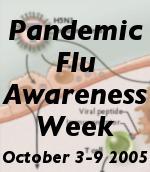pandemic flu, earthquakes, and taking care of each other
 (cross-posted to Original Medicine)
(cross-posted to Original Medicine)Last week was Pandemic Flu Awareness Week, organized by the folks who started the Flu Wiki, which is an international collaborative project aimed at collecting useful information and guidelines to share with communities and individuals for planning and preparing in the event of an influenza pandemic. There is excellent information there on influenza history, epidemiology, immunology, etc., as well as suggestions for public health considerations and areas communities and individuals would do well to consider beforehand.
There was indeed much more information in the news about pandemic flu preparedness (or, in most cases, the acute lack of preparedness so far) than there had been before the collective mind had been put on alert by Hurricane Katrina. King County executive Ron Sims convened a Business Forum on Pandemic Flu in the Seattle area, telling the 75 attendees, “This is the one that keeps me up at night,” and "spoke of 'devastating consequences' and 'extraordinary measures' that will follow when – not if – the avian flu virus mutates to allow human-to-human contact and attacks the globe." There was discussion of, and lots of commentary on, the federal government's preparedness plan (still in draft form, not publically released yet) in newspapers and in blogs.
DemFromCT at The Next Hurrah suggests that "We don't all need to turn survivalist today, but educating ourselves about the potential risks and keeping up with the news is a prudent thing to do. Some preparation efforts will serve you in a hurricane, a blizzard, a blackout or an earthquake. The difference with pandemic flu is that everyone is affected, and that's another thing to keep in mind (you can't expect huge amounts of help from a neighbor state)."
and, writing also at The Daily Kos says, " So what's a reasoned approach? In a nutshell, plan for the worst and hope for the best. All this discussion, this hype, if you will, is designed to teach people that the reality of a pandemic is real and that planning is worthwhile and can save lives. it also should teach everyone in Congress and the WH that having an intact public health apparatus (as my Flu Wiki colleagues the reveres at Effect Measure put it) that it's core public health functions (surveillance, vital records, maternal and child health, substance abuse, communicable disease, immunization, etc., etc.) that have been shafted and need to be built up. First responders are part of that. We should have learned that from 9/11, another teachable moment, but instead funds to support them have continued to be cut."
Such an important part of an "intact public health apparatus" is the strength of community relationships and networks. Remembering that "primary care" and "first response" begin with taking care of ourselves and our friends and relations, at the same time or before we turn to "experts" and "authorities". Knowing our neighbors and neighborhood resources, knowing who might need what kind of support if all the schools and stores and pharmacies are closed for a while.
Also see The Emergency Toolshed at global villages for some good ideas (thank you to Lucas Gonzalez, an Open Space friend and a physician in the Canary Islands, for a lot of this information).